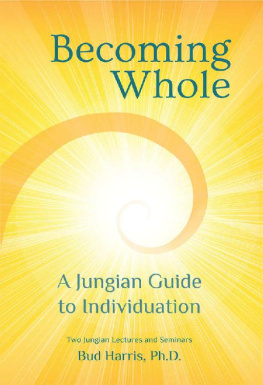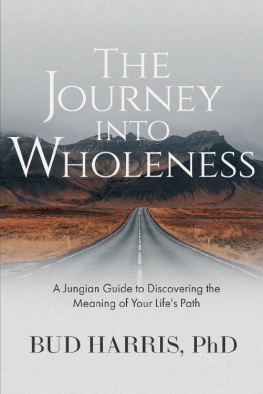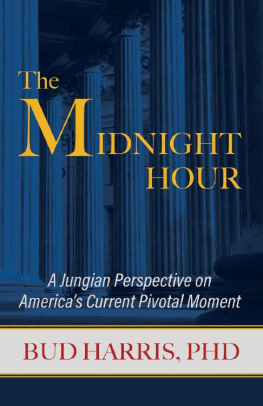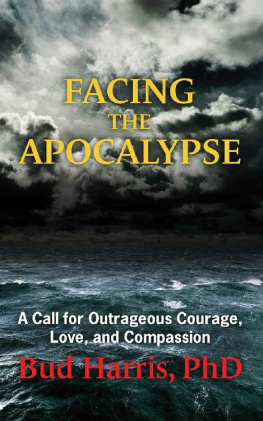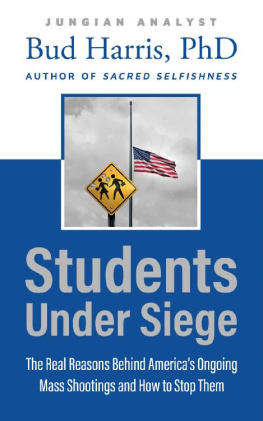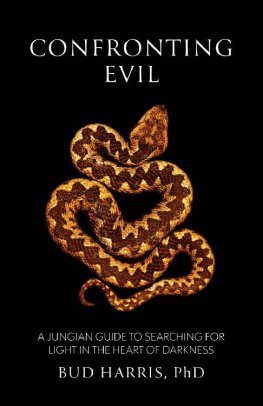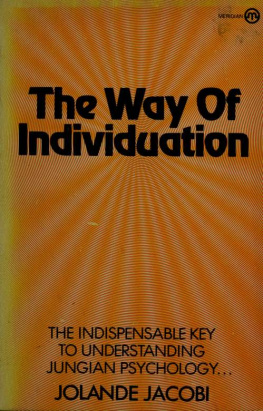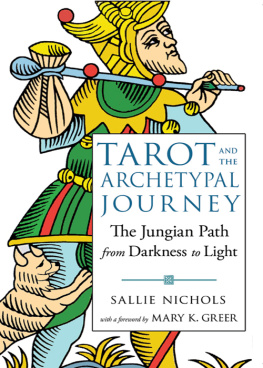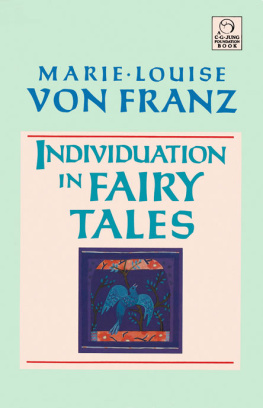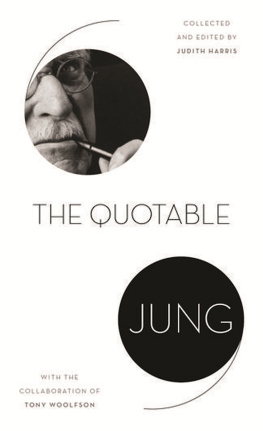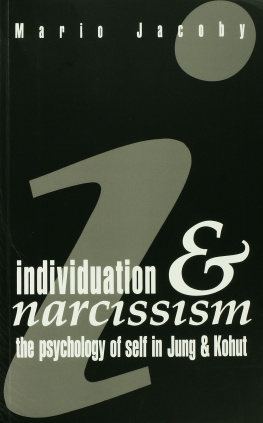Bud Harris - Becoming Whole: A Jungian Guide to Individuation
Here you can read online Bud Harris - Becoming Whole: A Jungian Guide to Individuation full text of the book (entire story) in english for free. Download pdf and epub, get meaning, cover and reviews about this ebook. year: 2016, publisher: Daphne Publications, genre: Religion. Description of the work, (preface) as well as reviews are available. Best literature library LitArk.com created for fans of good reading and offers a wide selection of genres:
Romance novel
Science fiction
Adventure
Detective
Science
History
Home and family
Prose
Art
Politics
Computer
Non-fiction
Religion
Business
Children
Humor
Choose a favorite category and find really read worthwhile books. Enjoy immersion in the world of imagination, feel the emotions of the characters or learn something new for yourself, make an fascinating discovery.
- Book:Becoming Whole: A Jungian Guide to Individuation
- Author:
- Publisher:Daphne Publications
- Genre:
- Year:2016
- Rating:4 / 5
- Favourites:Add to favourites
- Your mark:
- 80
- 1
- 2
- 3
- 4
- 5
Becoming Whole: A Jungian Guide to Individuation: summary, description and annotation
We offer to read an annotation, description, summary or preface (depends on what the author of the book "Becoming Whole: A Jungian Guide to Individuation" wrote himself). If you haven't found the necessary information about the book — write in the comments, we will try to find it.
Bud Harris: author's other books
Who wrote Becoming Whole: A Jungian Guide to Individuation? Find out the surname, the name of the author of the book and a list of all author's works by series.
Becoming Whole: A Jungian Guide to Individuation — read online for free the complete book (whole text) full work
Below is the text of the book, divided by pages. System saving the place of the last page read, allows you to conveniently read the book "Becoming Whole: A Jungian Guide to Individuation" online for free, without having to search again every time where you left off. Put a bookmark, and you can go to the page where you finished reading at any time.
Font size:
Interval:
Bookmark:
BECOMING WHOLE

Also by Bud Harris, Ph.D.
Radical Hope and the Healing Power of Illness: A Jungian Guide to Exploring the Body, Mind, Spirit Connection to Healing
Aging Strong: Living It Forward and Giving It Back
The Search for Self and the Search for God
Cracking Open: A Memoir of Struggling, Passages, and Transformations
Sacred Selfishness: A Guide to Living a Life of Substance
The Father Quest: Rediscovering an Elemental Force
Resurrecting the Unicorn: Masculinity in the 21st Century
The Fire and the Rose: The Wedding of Spirituality and Sexuality
Knowing the Questions Living the Answers: A Jungian Guide Through the Paradoxes of Peace, Conflict and Love that Mark a Lifetime
Coauthored with Massimilla Harris, Ph.D.:
Into the Heart of the Feminine: Facing the Death Mother Archetype to Reclaim Love, Strength, and Vitality
Like Gold Through Fire: Understanding the Transforming Power of Suffering
The Art of Love: The Craft of Relationships: A Practical Guide for Creating the Loving Relationships We Want

BECOMING WHOLE
A Jungian Guide to Individuation
DR. BUD HARRIS, PH.D.
DAPHNE PUBLICATIONS ASHEVILLE, NORTH CAROLINA
BECOMING WHOLE:
A JUNGIAN GUIDE TO INDIVIDUATION
COPYRIGHT 2016 BY BUD HARRIS
Copyright 2016
Becoming whole: a Jungian guide to individuation by Bud Harris.
All rights reserved. No part of this publication may be reproduced, stored in a retrieval system, or transmitted, in any form or by any means, electronic, mechanical, photocopying, recording, or otherwise, without the prior written permission of the publisher. Daphne Publications, 6 Cambridge Road, Asheville, North Carolina 28804
DAPHNE PUBLICATIONS, AN IMPRINT OF SPES, INC.
Library of Congress Control Number: 2016911457
Spes, Inc, Asheville, NC
Harris, Clifton T. Bud
Becoming whole: a Jungian guide to individuation/
ISBN 978-0-692-75428-3 Non-fiction
1. Personal Growth 2. Body, Mind and Spirit 3. Jungian Psychology 4. Spirituality
Interior Layout by Susan Yost
Authors Note:
This book comprises the text of two lectures and the seminars that accompanied them. I have presented these workshops and seminars in Asheville, North Carolina and in many other cities in the United States over the last ten years. The book includes the questions I asked to spark the audiences reflections and participation. I have also included the exercises from the seminars as well with the hope that you will find them stimulating and useful. As much as possible, I have maintained the original text of each lecture as it was delivered. I believe this makes the lectures more personal and easier to read and doesnt run the risk of changing any of my implied or intended meaning.
Bud Harris, Ph.D.
Asheville, North Carolina
Contents
PART ONE
Individuation: The Promise in Jungs Legacy and Why Our Culture Has Trouble Accepting It
PART TWO
A Lifetime of Promise: A Jungian Guide to Discovering the Transformative Power in Complexes
Introduction
As the dream opened with the force of something coming from the distant past, I found myself sitting in the front of a Shoneys Big Boy restaurant. The booth I was in was next to the large front window. While I sipped on my morning coffee, I looked out onto the main street of the town I grew up in. Across the street and the railroad tracks, was the white Presbyterian church my mother had taken me to when I was small and where her funeral service had taken place. Farther down the street were the high school, the bank and the shopping district. The fact that Shoneys still included the words Big Boy in its name placed the setting back in history. As I turned my head and looked across the table from me, I saw a small boy with ruffled brown hair and intense blue-grey eyes. Shocked, I realized that he was a five-year-old version of myself, before tragedy had struck our family. I looked into his eyes and he quietly said, What have you done with my life?
T hese lectures and seminars are part of the answer to that little boys question. They represent a portion of the path of living and working that I have been following for over four decades. My title: Becoming Whole: A Jungian Guide to Individuation reveals the common thread running throughout these lectures and seminars. Professionally, the process of becoming whole is called individuation. Personally, I call it the search for Self and the search for God (or the search for whatever you might like to call the Transcendent). However you designate it, individuation is a path of awakening, transforming, becoming conscious and fully engaged in living, being authentically alive and fulfilling the unique pattern within ourselves.
of this book Individuation: The Promise in Jungs Legacy and Why Our Culture Has Trouble Accepting It includes the C. G. Jung Memorial Lecture, sponsored by the Jung Society of Washington, D.C. that I was invited to give at the Swiss Embassy on the fiftieth anniversary of Jungs death. I believe that the continuing attraction to Jungian psychology rests on Jungs focus on the healthy personality. It also rests on the paradoxes included in the Jungian perspective. We will explore these paradoxes as we look into Jungs ideas that our suffering and struggles become meaningful parts of our lives when understood and that lifes hardships can initiate us into a more profound sense of being and satisfaction. Individuation, the centerpiece of Jungs legacy, is a path that shows us how self-knowledge not only helps us navigate the most difficult encounters with ourselves and life but also becomes the creative force behind expanding our psychic structure and attaining a fulfilled life.
In , we will invite this process into our lives and explore some of the reasons we have trouble accepting it by examining the following topics: (1) The Quest for Consciousness and Living a Life with Soul, (2) The Path of Individuation and Transformation as the Descent into Life, (3) The Jungian Process: Story, Dreams, Healing and Individuation, (4) Creative Transformation: Love and Wholeness.
In , we will examine why complexes, a central focus in Jungs work, are not signs of pathology unless we insist on repressing them, thus turning them into enemies, or we cannot or have not developed the ego strength to face them.
Jung thought that his work with complexes was so important that he almost named his work Complex Psychology instead of Analytical Psychology. Jung viewed complexes as both the energy fields and the building blocks of our psychic structures. will also help us understand how to realize and integrate complexes so they can become the architecture of a fulfilled life. We will see how, like the stone the builders rejected, our most devilish and frustrating complexes hold the greatest promise for expanding our personalities and our lives. We will also review how when they are repressed and battled against, complexes drain our energy like a chronic disease, souring our relationships with ourselves and everyone around us.
Learning how to face these challenges and unleash their transformative powers renews our energy, reconnects us to its source and enables our transformed complex to become the cornerstone in a more creative life. This chapter will show us how we can strengthen our personality for this work and explore the seven steps in transforming a complex from life-draining to life-empowering. As this process continues, we will also look into how it frees us from our history and inner conflicts and helps us live in partnership with our Self and the Divine within us.
Next pageFont size:
Interval:
Bookmark:
Similar books «Becoming Whole: A Jungian Guide to Individuation»
Look at similar books to Becoming Whole: A Jungian Guide to Individuation. We have selected literature similar in name and meaning in the hope of providing readers with more options to find new, interesting, not yet read works.
Discussion, reviews of the book Becoming Whole: A Jungian Guide to Individuation and just readers' own opinions. Leave your comments, write what you think about the work, its meaning or the main characters. Specify what exactly you liked and what you didn't like, and why you think so.

